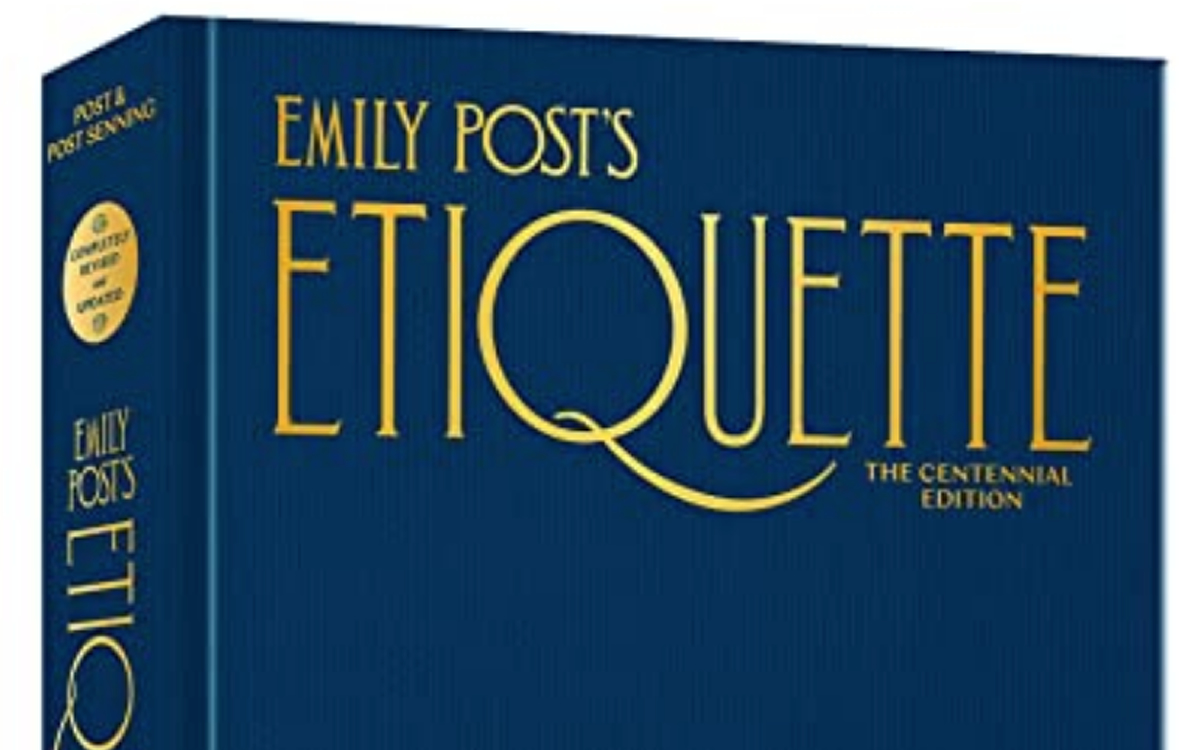Books
20th edition of Emily Post’s ‘Etiquette’ offers updated advice on pronouns and much more
A guide for daily life ‘with all its successes and mishaps’

Some families manage bakeries, nurseries, or vineyards.
For Daniel Post Senning, great-great grandson of Emily Post and an Emily Post Institute co-president, and Lizzie Post, great-great granddaughter of Emily Post and an Emily Post Institute co-president, etiquette is the family business.
The Emily Post Institute, based in Waterbury, Vt., conducts seminars and trainings. It partners with businesses and nonprofit groups to “bring etiquette and manners to a wide audience,” according to its website.
When you think of etiquette, you’re likely to be transported to Downton Abbey. Butlers, finger bowls, the dancing school lessons you hated as a kid – stuffy, rich (usually white, hetero) people at formal dinners managing a zillion salad forks – come to mind.
But, for Post and Senning, who co-host the popular, entertaining podcast “Awesome Etiquette,” etiquette is as far from being an ossified, exclusionary code of manners as we are from being the Dowager having tea at Downton.
Emily Post, the acclaimed etiquette maven, published her first book on etiquette, “Etiquette in Society, in Business, in Politics and at Home,” in 1922.
Post’s seminal book, considered by many to be the “holy writ” of etiquette (and stolen from libraries almost as frequently as the Bible), has been revised by Post herself and her descendants during the past century to evolve with changing times.
“Emily Post’s Etiquette, The Centennial Edition” by Lizzie Post and Daniel Post Senning, the 20th edition of Emily Post’s “Etiquette,” is just out. (For info on “Emily Post’s Etiquette, the Centennial Edition,” the Awesome Etiquette podcast and the Emily Post Institute, visit emilypost.com.)
The “Centennial Edition” has lively, up-to-date advice and discussion on everything in life in the early 2020s from the use of “mx” as a title to grief to respecting people’s pronouns to how to get company to stop making bigoted “jokes” to how to handle an inebriated guest.
From the get-go, Emily Post, who was born in Baltimore in 1872 during the Gilded Age and died in 1960, didn’t view etiquette as restrictive or exclusionary. “As Emily explained,’” Post and Senning write, “etiquette is not some rigid code of manners; it’s simply how persons’ lives touch one another.”
If you browse some editions of Emily Post’s books (as this reporter has), you won’t find schoolmarmish directives or ethereal descriptions of the etiquette gods’ mannered lives on Mount Olympus.
You’ll find daily life “with all its successes and mishaps,” Post and Senning write, “With tales like ‘How a Dinner Can Be Bungled’ and characters such as Mrs. Worldly, Constance Style, Mrs. Kindhart and the Onceweres.”
Emily Post painted relatable pictures of what to do and not to do, Post and Senning write.
Though Emily Post wouldn’t have known what a smartphone or social media were, her etiquette “still aims to equip you,” write Post and Senning, “with a sense of confidence and preparedness for some of the situations you’ll encounter at home, at work, in your social life, and when you’re out and about.”
Despite claims that etiquette is dead, it is very much alive, say Post and Senning.
Steven Petrow, an award-winning journalist and expert on civility and manners, agrees. “I’m always surprised by how timely Emily Post’s advice continues to be,” Petrow, who is gay, said in an email to the Blade. “Recently, I wrote about ‘monkeypox manners,’ and cited Mrs. Post’s timeless advice about respect, consideration and honesty in our social interactions, which includes those in the bedroom.”
Post and Senning graciously took time out from their busy schedules (the launch of the “Centennial Edition,” hosting their podcast – along with their other work with the Emily Post Institute) to talk with the Blade over the phone in separate interviews.
“Emily Post’s Etiquette, The Centennial Edition” was a Herculean labor of writing and editing for Post and Senning. It took a year to write the book, Post said. And, then there was all of the time spent to ensure that the book was carefully edited.
“I would write,” said Post, 40, who manages the Institute’s publishing efforts, “Dan would come in and help me edit the book.”
It was intense, “day-to-day” labor for her and Senning (along with their other work), Post said. “I’m grateful to all the people who were willing to have their lives disrupted while we worked on it,” she added.
Etiquette has been used for less than gracious purposes, Post said. “It can easily be exclusive.”
The Post family believes that etiquette is based on the principles of consideration, respect and honesty. This may sound abstract. But these principles aren’t empty words. They have a profound impact in the real world.
Before joining the Emily Post Institute in 2008 when he was 30, Senning worked in the performing arts, touring with the Laurie Cameron Company in Los Angeles.
Today, Senning, who lives in Duxbury, Vt., with his wife, Puja and their three children Anisha, Arya, and William, manages the Institute’s training programs. He has co-authored several books on etiquette covering topics from business to digital manners and regularly speaks with media outlets about business, technology, and dining etiquette.
In 2009, same-sex marriage became legal in Vermont. “Then, before the Supreme Court same-sex marriage ruling,” he said, “we were in the vanguard. We got questions about how to respond to same-sex weddings,” Senning added.
The Institute’s response was to note how normal civil unions were, Senning said, and that same-sex weddings weren’t different from hetero weddings.
“If you’re invited to a civil union, reply,” Senning recalled the Institute advising, “let people know if you can or can’t attend.”
Senning loved the “normalization” of the response. “It was really affirming to me,” he said.
Etiquette isn’t only for happy times. It’s called on when things get rough.
“Etiquette has a role in hard times,” Post, who’s been an American Express spokesperson and written columns for publications ranging from “Broccoli Magazine” to “Women’s Running,” said.
Many go through hard times from losing a job to being ill to grieving, she added. Emily Post may have written on etiquette a century ago, but her thoughts on grief ring as true on an iPad screen as they did then in a hardback book.
“At no time does solemnity so possess our souls as when we stand deserted at the brink of darkness into which our loved one has gone,” Emily Post wrote in 1922, “And the last place in the world where we would look for comfort at such a time is in the seeming artificiality of etiquette; yet it is in the moment of deepest sorrow that etiquette performs its most vital and real service.”
“All set rules for social observance have for their object the smoothing of personal contracts,” Emily Post added, “and in nothing is smoothness so necessary as in observing the solemn rites accorded our dead.”
Etiquette can help people grieve together in community through writing a condolence note, attending a funeral or another act of common grief, Lizzie Post said.
If you’ve suffered a loss, it can be incredible to realize the impact a loved one has had when you receive condolence notes or see so many people at a memorial service.
There’s a new trend where you can take part in the grief without going to a funeral, Post, who lives in her native state of Vermont, said. “When someone dies, for example, you raise a glass at five o’clock to honor them.”
Sometimes you have to use etiquette to stand against prejudice. If someone’s telling a racist or anti-queer joke at your dinner table, you’ll need to say, “‘I’m sorry. This is not a joke for this table,’” Post said.
While etiquette counsels against rudeness, safety trumps etiquette, Post and Senning have said on the Awesome Etiquette podcast and in the “Centennial Edition.”
Tolerance doesn’t mean tolerating an unwanted hug, an inappropriate touch or being “othered,” said Post, who has co-authored and authored etiquette books on topics ranging from weddings to legalized cannabis use.
Take hugging. “We talk about how to ask for a hug and how to block a hug,” Post said.
Etiquette experts, like the rest of us, take time off. On vacation, Post, co-author and narrator with Kelly Williams Brown of the Audible Original “Mistakes were Made” (think etiquette meets “Broad City”), doesn’t want to be rude to people. “But, sometimes, I don’t want to analyze behavior,” she said, “I just want to act.”
For info on the fascinating life of Emily Post, go to “Emily Post: Daughter of the Gilded Age, Mistress of American Manners” by Laura Claridge.
Books
How one gay Catholic helped change the world
‘A Prince of a Boy,’ falls short of author’s previous work

Brian McNaught, the pioneering gay activist and author of 1986’s “On Being Gay” and 1993’s “Gay Issues in the Workplace,” has written a personal account about his Catholic faith and homosexuality. It is a memoir without much substance.
“A Prince of a Boy: How One Gay Catholic Helped Change the World” (Cascade Books) is a strong personal statement by McNaught. He helped change family relationships. He helped change attitudes about homosexuality. He helped change workplaces, but the world?

In January 2023, the Catholic News Service reported that Pope Francis announced that, “being homosexual is not a crime.” In December 2023, NPR reported that Pope Francis approved “Catholic blessings for same-sex couples, but not for marriage.” Francis died Monday at age 88. Although Catholics may not see homosexuality as a crime, they see sex outside of marriage as a sin. They see same-sex marriage as a sin.
In 2021, Gallup reported that membership in the Catholic Church had declined 20 percent since 2000. In 2025, the Pew Research Center’s Religious Landscape Study found that nearly 40 percent of Americans identified as Protestant, while the same study found that only 19 percent identified as Catholic.
McNaught devotes much of his book to his life as a gay Catholic. It is challenging to read about his personal struggle. Some readers may find it interesting. Others might find it boring. Catholic readers may find it more compelling than Protestant readers.
As the above statistics prove, McNaught has much more work to do to change the Catholic Church’s views about homosexuality. We should be glad for his contribution to the debate within the Catholic Church. We should pray for full acceptance of gays in the Catholic Church.
“A Prince of a Boy” becomes more interesting when McNaught describes his work as an educator on LGBTQ issues. He has had an impact on workplace policies, academic programs, and public education, and his lectures, books, and other materials are widely used.
Based on my experience in the federal government and volunteering with LGBTQ organizations from the Bay Area to Washington, D.C., I believe McNaught’s work as an educator has improved LGBTQ lives, careers, and families. During the Clinton administration, I gave many copies of “Gay Issues in the Workplace” to personnel directors. I felt their staff could benefit from reading it. I thought it would help the lives and careers of my federal LGBTQ colleagues.
McNaught’s “A Prince of a Boy” was released in December 2024. Anti-gay crusader Anita Bryant died the same month. Bryant campaigned against a gay rights law in Florida. She began a national campaign against gays.
When Bryant successfully reversed a gay rights ordinance in Dade County, Florida, McNaught wrote the important essay “Dear Anita, Late Night Thoughts of an Irish Catholic Homosexual.” The essay is not in “A Prince of a Boy”; however, McNaught mentions Bryant.
In his training programs, McNaught describes homosexuals as journeying from confusion to denial to acceptance to pride. “Anita Bryant and AIDS brought Gay people to identity pride very quickly,” McNaught writes. San Francisco Supervisor Harvey Milk (1930-1978) and other activists reached similar conclusions about Bryant’s vicious anti-gay campaign.
McNaught helped change the LGBTQ world and brought pride to many people’s lives. McNaught walks in pride, works in pride, and educates others in pride.
“A Prince of a Boy” is a disappointing book. It provides small details about Brian McNaught’s large, proud life. A meaningful biography about this great gay leader is long overdue.
The Blade may receive commissions from qualifying purchases made via this post.
Books
‘Pronoun Trouble’ reminds us that punctuation matters
‘They’ has been a shape-shifter for more than 700 years

‘Pronoun Trouble’
By John McWhorter
c.2025, Avery
$28/240 pages
Punctuation matters.
It’s tempting to skip a period at the end of a sentence Tempting to overuse exclamation points!!! very tempting to MeSs with capital letters. Dont use apostrophes. Ask a question and ignore the proper punctuation commas or question marks because seriously who cares. So guess what? Someone does, punctuation really matters, and as you’ll see in “Pronoun Trouble” by John McWhorter, so do other parts of our language.

Conversation is an odd thing. It’s spontaneous, it ebbs and flows, and it’s often inferred. Take, for instance, if you talk about him. Chances are, everyone in the conversation knows who him is. Or he. That guy there.
That’s the handy part about pronouns. Says McWhorter, pronouns “function as shorthand” for whomever we’re discussing or referring to. They’re “part of our hardwiring,” they’re found in all languages, and they’ve been around for centuries.
And, yes, pronouns are fluid.
For example, there’s the first-person pronoun, I as in me and there we go again. The singular I solely affects what comes afterward. You say “he-she IS,” and “they-you ARE” but I am. From “Black English,” I has also morphed into the perfectly acceptable Ima, shorthand for “I am going to.” Mind blown.
If you love Shakespeare, you may’ve noticed that he uses both thou and you in his plays. The former was once left to commoners and lower classes, while the latter was for people of high status or less formal situations. From you, we get y’all, yeet, ya, you-uns, and yinz. We also get “you guys,” which may have nothing to do with guys.
We and us are warmer in tone because of the inclusion implied. She is often casually used to imply cars, boats, and – warmly or not – gay men, in certain settings. It “lacks personhood,” and to use it in reference to a human is “barbarity.”
And yes, though it can sometimes be confusing to modern speakers, the singular word “they” has been a “shape-shifter” for more than 700 years.
Your high school English teacher would be proud of you, if you pick up “Pronoun Trouble.” Sadly, though, you might need her again to make sense of big parts of this book: What you’ll find here is a delightful romp through language, but it’s also very erudite.
Author John McWhorter invites readers along to conjugate verbs, and doing so will take you back to ancient literature, on a fascinating journey that’s perfect for word nerds and anyone who loves language. You’ll likely find a bit of controversy here or there on various entries, but you’ll also find humor and pop culture, an explanation for why zie never took off, and assurance that the whole flap over strictly-gendered pronouns is nothing but overblown protestation. Readers who have opinions will like that.
Still, if you just want the pronoun you want, a little between-the-lines looking is necessary here, so beware. “Pronoun Trouble” is perfect for linguists, writers, and those who love to play with words but for most readers, it’s a different kind of book, period.
The Blade may receive commissions from qualifying purchases made via this post.
‘The Cost of Fear’
By Meg Stone
c.2025, Beacon Press
$26.95/232 pages
The footsteps fell behind you, keeping pace.
They were loud as an airplane, a few decibels below the beat of your heart. Yes, someone was following you, and you shouldn’t have let it happen. You’re no dummy. You’re no wimp. Read the new book, “The Cost of Fear” by Meg Stone, and you’re no statistic. Ask around.

Query young women, older women, grandmothers, and teenagers. Ask gay men, lesbians, and trans individuals, and chances are that every one of them has a story of being scared of another person in a public place. Scared – or worse.
Says author Meg Stone, nearly half of the women in a recent survey reported having “experienced… unwanted sexual contact” of some sort. Almost a quarter of the men surveyed said the same. Nearly 30 percent of men in another survey admitted to having “perpetrated some form of sexual assault.”
We focus on these statistics, says Stone, but we advise ineffectual safety measures.
“Victim blame is rampant,” she says, and women and LGBTQ individuals are taught avoidance methods that may not work. If someone’s in the “early stages of their careers,” perpetrators may still hold all the cards through threats and career blackmail. Stone cites cases in which someone who was assaulted reported the crime, but police dropped the ball. Old tropes still exist and repeating or relying on them may be downright dangerous.
As a result of such ineffectiveness, fear keeps frightened individuals from normal activities, leaving the house, shopping, going out with friends for an evening.
So how can you stay safe?
Says Stone, learn how to fight back by using your whole body, not just your hands. Be willing to record what’s happening. Don’t abandon your activism, she says; in fact, join a group that helps give people tools to protect themselves. Learn the right way to stand up for someone who’s uncomfortable or endangered. Remember that you can’t be blamed for another person’s bad behavior, and it shouldn’t mean you can’t react.
If you pick up “The Cost of Fear,” hoping to learn ways to protect yourself, there are two things to keep in mind.
First, though most of this book is written for women, it doesn’t take much of a leap to see how its advice could translate to any other world. Author Stone, in fact, includes people of all ages, genders, and all races in her case studies and lessons, and she clearly explains a bit of what she teaches in her classes. That width is helpful, and welcome.
Secondly, she asks readers to do something potentially controversial: she requests changes in sentencing laws for certain former and rehabilitated abusers, particularly for offenders who were teens when sentenced. Stone lays out her reasoning and begs for understanding; still, some readers may be resistant and some may be triggered.
Keep that in mind, and “The Cost of Fear” is a great book for a young adult or anyone who needs to increase alertness, adopt careful practices, and stay safe. Take steps to have it soon.
The Blade may receive commissions from qualifying purchases made via this post.
-

 Federal Government3 days ago
Federal Government3 days agoHHS to retire 988 crisis lifeline for LGBTQ youth
-

 Opinions3 days ago
Opinions3 days agoDavid Hogg’s arrogant, self-indulgent stunt
-

 District of Columbia2 days ago
District of Columbia2 days agoD.C. police seek help in identifying suspect in anti-gay threats case
-

 Virginia3 days ago
Virginia3 days agoGay talk show host wins GOP nom for Va. lieutenant guv












